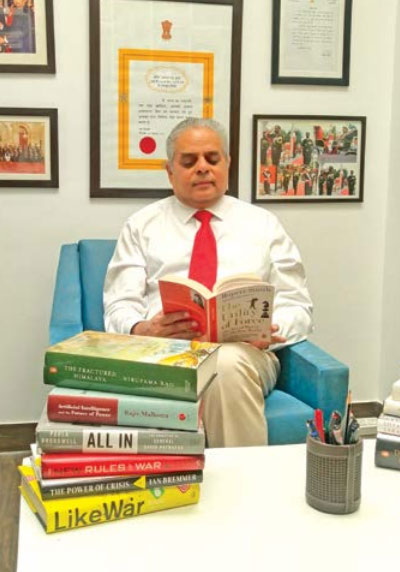 Lt Gen Raj Shukla (Retd)
Lt Gen Raj Shukla (Retd)
The profession of arms is as broad and deep as any other, medicine, law, finance or business. While being premised fundamentally on strong levels of fitness, a love for the outdoors and a sense of adventure (the salience therefore of physicality and brawn in the military dynamic); in the long run, what separates the men from the boys is knowledge and wisdom, as against mere domain competence.
The primary source of such wisdom and knowledge are books, supplemented of course by a variety of other tools: thoughtful articles, quality professional journals, digital content, informed debates and conversations and most importantly the habit of ‘deep reflection.’ The fount of knowledge so developed, helps to nourish world views and enables officers take a wide angled view of national security, so critical to successful soldiering in the modern world.
The aspirational ideal should be to fuse thought and action—think like men of action and act like men of thought. Here are a few recommended books that readers may find useful.
Nuclear Weapons and Indian Security: The Realist Foundations of Strategy by Bharat Karnad. Though titled as such, the book is far more than a treatise on nuclear weapons. It is a comprehensive account of the evolution of India’s strategic thought from the days of the Arthashastra, the Vedas and the Yudhkandam to our post-Independence national security structures and challenges. It is an epitome of brilliant insights and thoughtful analysis. The author Bharat Karnad is often described in Indian strategic circles as a ‘hawk’; yet, ironically, much of his realism, at some point becomes our strategic policy. The book is essential reading to understand as to why the instrument of force is so critical in the evolution of a nation’s strategic outlook. For serious soldiers, it must be read over a leisurely period of time; a bedside accompaniment to be absorbed bit by bit, page after thoughtful page.
Every Man A Tiger: The Gulf War Air Campaign by Tom Clancy with General Chuck Horner. Tom Clancy along with General Chuck Horner, a USAF General who commanded the US and Allied Air Forces during Desert Shield and Desert Storm, piece together in graphic detail the triumphs and travails of jointmanship and integration in the US military. The book espouses in very lucid terms the benefits of the army, the air force, the navy and the marines subordinating their single service aspirations to the larger combat good. A riveting read, it brings to light and drives home the huge operational payoffs in the combat theatre, of the game-changing Barry Goldwater Nichols Act. In the context of India’s own ongoing struggle with integration reforms, the book is a must read to develop a deeper, nuanced and comprehensive understanding of the jointmanship paradigm.
Elon Musk: How The Billionaire CEO of Space X and Tesla is Shaping Our Future by Ashlee Vance. In an age of sharp technological competition between militaries, the story of Elon Musk and the forays of Space X with US SPACECOM, drives home the salience of space as also private sector competencies (innovation, talent, risk taking, energy and enterprise) in both modern military capacity building and warfighting (the great combat utility of Starlink Terminals in Ukraine is a good example).
It is about the coming together of the magic of business, innovation and science in the pursuit of national security capacities. The author outlines in fascinating detail, how Space X edged out the traditional prima donnas like Lockheed and even NASA, to break into the sacred domain of ‘military space.’ As the race for technological innovation between militaries intensifies, private sector participation in capacity building and warfighting will only grow Should not India brace up accordingly? The book provides some food for thought, for deeper introspection and possible emulation.
The New Rules of War: Victory in The Age of Durable Disorder by Sean Mc Fate. Sean Mc Fate has been dubbed as a modern-day Sun Tzu by Admiral James Stavridis, former Supreme Allied Commander at NATO. In the book, the author, with rare brilliance, explains the great continuities in the nature of war even as he expounds with equal facility the humongous changes occurring in the character of war.
Very thoughtfully, Sean points out as to how traditional Clausewitzean postulates are being challenged increasingly by the Sun Tzu thought stream. He drives home the growing importance of the Grey Zone in contemporary conflict, while underlining the need for modern militaries to embrace parallel competencies, in both competition and conflict—a huge ask. In sum, the book is a thought-provoking account of the evolution of war in contemporary conflict.
The Guilty Men Of 1962 by D.R. Mankekar and Self-Deception: India’s China Politics—Origins, Premises, Lessons by Arun Shourie. As the Chinese challenge looms large, I would urge that the two books be read in concert. The Guilty Men of 1962 sketches the personas and events that led to the military disaster; in some ways a bitter contest between ‘sheer power’ and some ‘undergrad idealism.’ It is pertinent in the current context, if only to educate us, about the hardball of the Sino-Indian relationship. Of course, 2022 is not 1962. We have done a lot, and we are doing a great deal. But do we need to do a lot more?
When read in concert with Arun Shourie’s account, which is an exhortation to be wary of China’s great strategic cunning in statecraft (both, in a historical context as also in the light of the emerging contestation), there are important lessons for the Indian military as also the larger polity. We do need to read and more importantly pay heed.
(The writer recently retired as GOC-in-C, Army Training Command. He can be reached at rajshukla35@yahoo.com)

